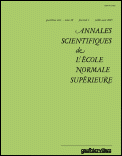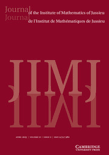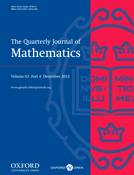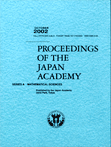
BULLETIN DE LA SOCIETE MATHEMATIQUE DE FRANCE
Scope & Guideline
Exploring the depths of mathematical inquiry.
Introduction
Aims and Scopes
- Representation Theory:
The journal frequently publishes articles related to the representation theory of groups, particularly focusing on finite groups and their structures. - Geometric Analysis:
A significant number of papers explore geometric properties and their implications, including studies on manifolds, curvature, and geometric dynamics. - Algebraic Geometry:
The journal includes research on algebraic cycles, Fano varieties, and other algebraic structures, contributing to the understanding of geometric properties within algebraic contexts. - Dynamical Systems:
There is a consistent focus on dynamical systems, including the behavior of diffeomorphisms and the dynamics of various mathematical constructs. - Probability and Random Walks:
Papers addressing probabilistic methods, particularly involving random walks and their applications in mathematical analysis, are a recurring theme. - Number Theory:
Research related to number fields, continued fractions, and p-adic analysis indicates a strong connection to number theory within the journal's publications.
Trending and Emerging
- Higher-Dimensional Geometry and Topology:
Recent papers have increasingly focused on higher-dimensional constructs, such as higher-dimensional manifolds and their topological properties, signaling a trend towards more complex geometric theories. - Interdisciplinary Approaches:
There is a growing trend of interdisciplinary research that combines mathematics with other fields, such as physics and computer science, particularly in areas like dynamical systems and representation theory. - Advanced Probabilistic Methods:
The emergence of papers dealing with advanced probabilistic techniques and their applications to various mathematical problems indicates a shift towards more nuanced statistical and probabilistic analyses. - Nonlinear Dynamics and PDEs:
A noticeable increase in research around nonlinear dynamics, particularly related to partial differential equations (PDEs), reflects a rising interest in the mathematical modeling of complex systems.
Declining or Waning
- Elementary Number Theory:
There has been a noticeable decrease in papers focusing on elementary number theory, as more complex and abstract approaches take precedence in current research. - Classical Algebraic Structures:
Topics centered around traditional algebraic structures, such as basic group theory and elementary ring theory, seem to be less frequently addressed in recent issues. - Basic Geometric Constructs:
Studies that focus solely on classical geometric constructs without a deeper analytical or algebraic context are becoming less common.
Similar Journals

Annales Mathematiques du Quebec
Elevating the Standards of Mathematical ScholarshipAnnales Mathematiques du Quebec, published by Springer Heidelberg, is a distinguished journal dedicated to the dissemination of innovative research in the field of mathematics. With an ISSN of 2195-4755 and E-ISSN 2195-4763, this scholarly publication has indicated its commitment to high-quality peer-reviewed articles since its inception in 2013. Situated in Switzerland, the journal is recognized for its contribution to the mathematical community, evidenced by its current Q2 ranking within the miscellaneous mathematics category in 2023. Though specific open access options are not detailed, the journal maintains prominence through its rigorous standards and relevance, with a Scopus rank of #248 out of 399, placing it in the 37th percentile in the category of General Mathematics. Researchers, professionals, and students are encouraged to engage with the latest findings and insights published in this journal, which aims to foster collaboration and innovation in mathematical research.

Pure and Applied Mathematics Quarterly
Pioneering Insights in Pure and Applied MathematicsPure and Applied Mathematics Quarterly is a prestigious journal published by INT PRESS BOSTON, INC, focusing on the diverse and evolving field of mathematics. Since its inception in 2007, this journal has grown significantly, currently holding a Q1 ranking in the Mathematics (Miscellaneous) category for 2023, positioning it among the leading publications in the discipline. With a commitment to publishing high-quality research, Pure and Applied Mathematics Quarterly fosters innovation and dialogue within the mathematical community by providing a platform for theoretical advancements and practical applications. The journal remains accessible to researchers and professionals through its ISSN 1558-8599 and E-ISSN 1558-8602, although it does not currently offer open access. As a vital resource for mathematicians, educators, and students, this journal endeavors to expand the frontiers of mathematical knowledge and contribute to the academic dialogue surrounding this fundamental science.

ANNALES SCIENTIFIQUES DE L ECOLE NORMALE SUPERIEURE
Connecting Ideas, Inspiring Discoveries in MathematicsANNALES SCIENTIFIQUES DE L ECOLE NORMALE SUPERIEURE is a distinguished journal published by the Société Mathématique de France, dedicated to advancing the field of mathematics through high-quality research articles. With a robust impact factor and categorized as Q1 in Mathematics (Miscellaneous) as of 2023, this journal ranks in the top 16% of mathematics publications, showcasing its importance and influence in the discipline. Available in both print (ISSN: 0012-9593) and electronic formats (E-ISSN: 1873-2151), ANNALES SCIENTIFIQUES serves as a central hub for innovative mathematical theories and methodologies, appealing to a diverse audience of researchers, professionals, and students alike. The journal publishes research that spans various domains within mathematics, fostering a collaborative environment for idea exchange. As it converges from 1997 to 2024, it continues to shape the mathematical landscape, providing essential insights and developments within the global academic community. Located in Paris, France, the journal invites contributions that push boundaries and advance the understanding of complex mathematical concepts.

ANNALES DE L INSTITUT FOURIER
Exploring the Depths of Number Theory and TopologyANNALES DE L INSTITUT FOURIER is a premier academic journal published by ANNALES INST FOURIER, specializing in the fields of Algebra and Number Theory as well as Geometry and Topology. Since its establishment, the journal has garnered a distinguished reputation, evidenced by its Q1 quartile ranking in the 2023 category assessments and its Scopus Rank of #37 out of 119 in Algebra and Number Theory, and #34 out of 106 in Geometry and Topology, placing it within the top percentile of its field. The journal serves as a vital platform for disseminating groundbreaking research and innovative methodologies, catering to a global audience of researchers, professionals, and students. With a commitment to the advancement of mathematical sciences, ANNALES DE L INSTITUT FOURIER invites contributions that push the boundaries of knowledge and foster collaboration across disciplines. Although it does not offer open access, the rigorous peer-review process ensures that published papers meet the highest academic standards, making it a critical resource for anyone engaged in advanced mathematical research.

Journal of the Institute of Mathematics of Jussieu
Fostering Collaboration for Tomorrow's Mathematical BreakthroughsJournal of the Institute of Mathematics of Jussieu, published by Cambridge University Press, is a leading academic journal that has established itself as a vital resource in the field of mathematics. With an impressive impact factor and a ranking in the top quartile (Q1) of miscellaneous mathematics, the journal serves as a platform for high-quality research from both established scholars and emerging researchers. Spanning from 2002 to 2024, the journal aims to foster collaboration and innovation in the mathematical community by publishing original research articles, reviews, and critical discussions on a wide range of mathematical topics. Although the journal does not offer open access, it remains widely accessible through various academic institutions and libraries, ensuring that critical advancements in mathematics are shared with a global audience. Located in the United Kingdom at the prestigious Cambridge campus, the journal reflects the rigorous standards of its publisher and the rich academic tradition of its home institution.

Cambridge Journal of Mathematics
Fostering Collaboration Through Mathematical InquiryCambridge Journal of Mathematics, published by INT PRESS BOSTON, INC, is a premier platform for the dissemination of cutting-edge research in the field of mathematics. With an ISSN of 2168-0930 and E-ISSN 2168-0949, this journal stands out in a competitive academic landscape, currently ranked #58 out of 399 in General Mathematics, placing it in the top 15% within its category according to Scopus metrics. The journal serves as a vital resource for researchers, professionals, and students alike, aiming to foster groundbreaking mathematical inquiries and foster collaboration across disciplines. Published from 2020 to 2024, the Cambridge Journal of Mathematics is committed to maintaining high standards of scholarship, making it an essential read for those who are passionate about advancing mathematical knowledge and its applications.

PUBLICATIONES MATHEMATICAE DEBRECEN
Pioneering Insights in Theoretical and Applied MathematicsPublicationes Mathematicae Debrecen is a renowned international journal published by the University of Debrecen, Institute of Mathematics, situated in Hungary. This journal, with both ISSN 0033-3883 and E-ISSN 2064-2849, has established itself in the field of mathematics since its inception, with coverage extending from 1997 to 2024. Recognized for its rigorous academic standards, it currently holds a Q3 ranking in the mathematics (miscellaneous) category for 2023 and ranks at the 42nd percentile among general mathematics journals in Scopus. Publicationes Mathematicae Debrecen aims to disseminate high-quality research across various areas of mathematics, contributing to the advancement of knowledge and practice in this dynamic field. Although it is not an open-access journal, its readers can access a wealth of scholarly work that addresses both theoretical and applied mathematical issues, making it an invaluable resource for researchers, professionals, and students alike.

JOURNAL OF THE KOREAN MATHEMATICAL SOCIETY
Unveiling new ideas in the realm of mathematics.JOURNAL OF THE KOREAN MATHEMATICAL SOCIETY is a premier academic publication dedicated to advancing the field of mathematics through rigorous research and scholarly discourse. Published by the esteemed Korean Mathematical Society, this journal provides a platform for mathematicians and researchers to disseminate their findings, engage in innovative ideas, and connect with the global mathematical community. With an ISSN of 0304-9914 and E-ISSN 2234-3008, the journal has established itself as an important resource in the mathematical landscape, currently holding a Q3 classification in the ‘Mathematics (miscellaneous)’ category as per the 2023 rankings. Though not open access, the journal is committed to promoting high-quality contributions that span various mathematical disciplines, making it indispensable for students, researchers, and professionals alike. Operating from its base in Seoul, South Korea, it contributes to the international mathematics community by publishing cutting-edge research from 1997 to 2024 and beyond, facilitating an avenue for knowledge sharing and innovation in mathematics.

QUARTERLY JOURNAL OF MATHEMATICS
Empowering the Mathematical Community, One Quarter at a TimeQuarterly Journal of Mathematics, published by Oxford University Press, stands as a pivotal resource for the mathematical community, focusing on a broad spectrum of topics in the field of mathematics. With its esteemed history dating back to 1930, this journal continues to foster innovative research and discussions, providing a platform for scholars to share their findings and insights. Although the journal currently holds a Q3 classification in mathematics (miscellaneous) and is ranked #207 among general mathematics publications in the Scopus database, its commitment to quality and rigorous peer review ensures that it remains relevant and insightful. Researchers, professionals, and students alike will find the Quarterly Journal of Mathematics an invaluable tool for advancing knowledge and understanding in various mathematical disciplines, making it an essential addition to any academic library.

PROCEEDINGS OF THE JAPAN ACADEMY SERIES A-MATHEMATICAL SCIENCES
Illuminating Trends and Developments in Mathematical Sciences.PROCEEDINGS OF THE JAPAN ACADEMY SERIES A-MATHEMATICAL SCIENCES, published by the JAPAN ACADEMY, serves as a premier platform for disseminating original research in the field of mathematical sciences. Based in Japan, this journal has been a vital contributor to the global mathematical community since its inception, with continuous publication from 1996 to 2024. While it currently holds a Q3 ranking in the miscellaneous mathematics category according to the 2023 category quartiles, it provides an invaluable repository of knowledge that facilitates advancements in various mathematical disciplines. Although it is not an open-access journal, it remains widely regarded for its rigorous peer-review process, ensuring that high-quality research is presented to its audience. The journal is essential for researchers, professionals, and students eager to stay informed about novel developments and trends in mathematics. With an ISSN of 0386-2194, it aspires to foster collaboration and innovation within the mathematical sciences.